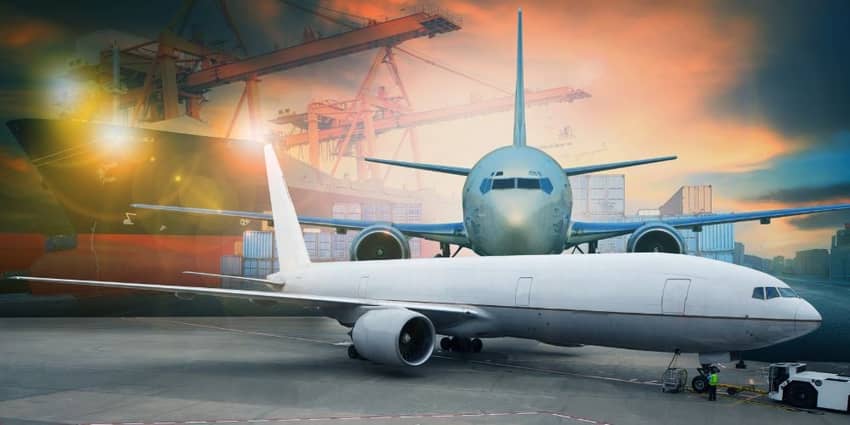In today's interconnected global economy, international logistics plays a pivotal role in driving success.
More companies are looking to reduce costs and tap into new markets, whether it’s domestically or overseas. It’s why mastering the intricacies of international logistics is vital. Of course, there are challenges to navigate as well.
But you can achieve global success by embracing technology, implementing efficient processes and partnering with the right providers. So how do you start? Here’s everything you need to know to help you kickstart your journey.
What International Shipping Means?
International logistics plays a crucial role in the smooth movement of products across borders in the global marketplace. It incorporates the complex process of transporting items through an international supply chain. From cross-border shipping to international distribution, it ensures goods reach recipients no matter where in the world they are in a timely and cost-effective manner.
Most importantly, it enables ecommerce businesses to expand their reach and serve customers across the globe.
What Does International Logistics Involve?
Expanding into new markets is easier than ever for ecommerce businesses. But, there are still some intricacies when it comes to establishing a robust supply chain. When you start building a global brand, navigating international logistics requires a robust strategy. From determining the types of products suitable for overseas markets to accounting for additional shipping costs, fulfilment can get quite complex.

Here’s a brief overview of what international logistics operations entail and what is involved in expanding your brand's global footprint.
Handling of Goods
When exploring new markets, assessing your current approach to handling products is crucial. For example, do you currently store inventory and fulfil orders from a single location? You'll need to consider the logistics and costs associated with shipping international orders overseas from this space.
You can continue to ship international orders this way. But it may be worth exploring the possibility of relocating or expanding into a facility closer to an international depot. This can reduce shipping costs, as products can reach their destination more efficiently.
Another option is to explore fulfilment centres in countries where you experience a significant volume of orders. This allows for items to be efficiently picked, packed, and shipped locally, streamlining the fulfilment process.
Adopting a global approach brings several benefits. For example, you can reduce common customs and tariff issues. By storing inventory within the destination country, you can utilise domestic shipping. It reduces complexities and ensures a smoother customer experience.
Mode of Transportation
You have a range of transportation options to choose from with global shipping. Each one features its own benefits in terms of budget and delivery timelines. To make an informed decision, it's essential to consider the delivery time, cost, and reliability. They must align with your profit margins and customer expectations.
In many cases, delivering an order to an international destination involves multiple modes of transportation. Particularly when cross-border shipping is involved. Going from one location to another, along with the necessary transit points, requires careful planning to ensure smooth and efficient delivery.
Transportation Process
Navigating the transportation process for international orders can be tricky. Delivery times vary significantly depending on the destination. It can take longer due to the involvement of multiple governing bodies and various modes of transportation across borders.
To ensure a smooth process, it's crucial to review shipping documentation and ensure your products comply with the trade rules and regulations of the respective countries.
It's also essential to communicate transparently with your customers regarding estimated delivery times and any issues they may incur. Keeping your customers informed will provide a better customer experience.
Customs and Import Duties
You must familiarise yourself with any additional fees, such as customs and import duties. Authorities impose these taxes in the destination country on imported goods. They vary based on the value of the items being shipped.
Clearing customs requires proper documentation and attention to detail. You’ll need to include accurate information, such as tariff codes, dollar values, and product descriptions, to prevent delays.
It's your responsibility to inform your customers about these additional fees. Failing to do so may result in customers being unaware of the duties they need to pay to receive their package. It can even lead to non-delivery or refusal to claim the package.
Why is International Logistics Important?
International logistics has gained significant importance primarily due to the growth of economies. Individuals and businesses are focussing on doing fewer things better. It allows for greater competition and creativity.
The advancements in international communications over the past century have drastically reduced costs and time delays. It allows global shipping to be more feasible and cost-effective.
According to reports, ecommerce stores have already started exploring international logistics. Australian Financial Review recently revealed that the number of Australian merchants selling online doubled in 2022. Australia Post also shared that 63% of Australian retailers are sending parcels globally. This is up from 54% in 2022.
How to Create an International Logistics Strategy?
Choose Where to Start Selling Your Products
Venturing into international shipping can be intimidating. A good approach is to target specific countries so you can test the waters and gather insights. These five locations are good places to start.
- New Zealand
- New Zealand are practically neighbours, making it an ideal starting point for international expansion.
- The Trans-Tasman Agreement promotes trade between Australia and New Zealand, making for smoother shipping processes.
- The country has a strong appetite for Australian products, which makes it easier for you to break into the market.
- Singapore
- Singapore is a major regional hub for ecommerce in Southeast Asia.
- The ecommerce market in Singapore is projected to grow by 12% annually until 2027.
- The location makes distribution easier to neighbouring countries, expanding your regional reach.
- Hong Kong
- Hong Kong is a global financial centre and gateway to China. It offers access to a vast consumer market.
- Hong Kong has a strong logistics infrastructure, facilitating efficient shipping and delivery.
- Selling in Hong Kong can provide a stepping stone for further expansion into the Chinese market.
- Canada
- Canada's proximity to the USA makes it a good option for businesses looking to establish a North American presence.
- The Canadian market offers a high standard of living and a diverse customer base.
- Leveraging trade agreements, such as the Comprehensive and Progressive Agreement for Trans-Pacific Partnership (CPTPP), can facilitate smoother trade relations between Australia and Canada.
- United States
- The United States is one of the largest consumer markets globally.
- The country features established platforms and a strong culture of online shopping.
- While significant competition exists, it substantially rewards businesses navigating its complexities.
Find a Courier with Competitive Rates
Choosing the right carrier to deliver your products to other countries is vital to your success as an international business. You could try to stick with one trusted and respected courier provider. But it might not be suitable for all territories you plan on covering.
Utilising a multicarrier shipping solution is recommended. It will provide the most competitive rates from carriers that deliver to that location. If you’re using Interparcel, you can even filter the results by price, service and estimated delivery time.
Offer Delivery Options at Checkout
Much like Australian consumers, international customers will also want choice at checkout when it comes to delivery. It could be a last-minute Christmas gift or a product they really need to get their hands on.
Solutions like Interparcel’s Live Shipping Rates can facilitate choice at checkout. Courier prices are updated in real-time, giving customers the best options for their needs and budget. Plus, it builds trust through cost transparency, as you’re not charging extra for shipping.
Choose the Right Packaging
Selecting the best packaging is crucial for shipping internationally. Considering the extended transit times involved, paying close attention to packaging becomes vital.
Before sending packages overseas, carefully assess the dimensions of your various order sizes. It's essential to account for dimensional weight, as this may impact shipping costs. Providing accurate calculations helps ensure the precise amount is charged. As a best practice, rounding up to the nearest centimetre and kilogram is recommended.
Protecting fragile items requires extra attention. Ensure they are securely packed with adequate cushioning. Long journeys across different climates can pose risks to the integrity of items, making sturdy packaging even more critical. Some may also require specific packaging requirements to meet international shipping regulations.
Have the Correct Documentation for Customs
One of the most important components for international delivery is the documentation. The customs/commercial invoice is perhaps the most vital. Incorrectly filling it out can lead to delays and unnecessary expenses.
You must specify five key items to ensure smooth customs processing:
- Country of Origin: Indicate the origin of the merchandise, referring to the country where it comes from.
- Exporter and Consignee Details: Provide your name and address as the exporter and the buyer's details as the consignee.
- Detailed Item Description: Include a comprehensive description of the item, encompassing its nature, composition, and purpose. This information aids the customs team in processing the shipment efficiently.
- Quantities and Weights: Specify the quantities and weights, providing accurate measurements of the products.
- Purchase Price: State the purchase price of each item, reflecting the amount paid by the buyer for each individual product.
There are international logistics services that can handle the processing. But when shipping with Interparcel, the chosen carrier acts as the broker and manages the process on your behalf.
To make it easier for the carrier, include these additional details:
- Tariff Code: Include the appropriate tariff code for the shipped items.
- Certification of Origin: Provide certification of origin if required.
- Copy of Free Trade Agreements: Include a copy of any relevant Free Trade Agreements, if applicable.
Update Your Shipping and Returns Policy
Don’t forget to revise your shipping and returns policy to accommodate your expansion into other countries. Update your website with the relevant shipping destinations and provide comprehensive information regarding your global shipping practices.
It should cover essential details such as shipping costs, available methods, estimated delivery times and any additional fees or taxes. Clearly communicate whether customers are responsible for these additional charges.
You should also consider tailoring your online presence to cater to other countries. This can involve creating unique online stores specifically designed for different markets or optimising your website to cater to international buyers.
For example, you can Implement features like a multi-language translator tool or create targeted landing pages. This can enhance the user experience and engagement for visitors from other countries or regions.
How to Adapt Your Business to an International Market
While some businesses can simply open up shop in another country, others may need to make adjustments to cater for cultural differences and buying behaviours. In that case, here’s what needs to be considered.
Standardisation
Embracing standardisation can bring numerous benefits. Especially when managing a complex business with multiple employees and operational processes. By adopting consistent data delivery and uniform representations, you can compare different aspects of your operations more effectively. For example, standardised forms and protocols eliminate the need to spend time deciphering various formats. It allows employees to extract the necessary information quickly. Plus, when everyone is aligned in terms of vocabulary and processes, tasks become routine and can be executed more effectively.
There may be requirements for exceptions. But introducing deviations from a process can introduce complexities and outweigh the potential savings. Striking the right balance between standardisation and flexibility is key to optimising operational efficiency and achieving success in an international market.
Improve Visibility
Enhancing visibility is a powerful strategy to combat inefficiencies. You gain a competitive edge in managing a dynamic supply chain by improving the quality, timeliness, and comprehensiveness of tracking information. Particularly if you collaborate with partners who can benefit from predictability and advanced notice of your operations.
Having precise knowledge of the whereabouts of every component and the ability to track shipments down to the metre and minute can significantly streamline your operations. It allows for better planning, coordination, and decision-making. You can also proactively address any disruptions or delays. This will minimise impacts on your operations and improve customer satisfaction.
Controls
As you expand globally, you’ll need to implement effective controls to ensure smooth operations. Especially in locations where you’re not available is challenging. You could assign formal responsibility for outcomes and metrics to individuals on the ground. Another option is to conduct regular internal audits. The goal is to maintain operational integrity and adherence to your standards.
Auditors need to approach their role as helpful collaborators. Adopting a mindset of support and guidance can create a positive atmosphere. It will encourage open communication and cooperation with key teams and partners. It can even make audits seen as opportunities for growth and improvement rather than a compliance-focused exercise.
Communication
Effective communication is crucial for seamless coordination and collaboration within and across organisations. It is not uncommon for barriers to hinder quick and efficient communication. It impedes efforts to coordinate tasks, share knowledge and establish best practices.
To overcome any potential challenges, prioritise and encourage open communication among team members. Creating a supportive environment where employees are empowered to engage in conversations with the necessary stakeholders is essential. It will foster a culture of collaboration, innovation and knowledge sharing.
Strong Partnerships
Building strong partnerships is crucial for international success. While distance, time zones, cultural differences, language barriers, and varying areas of expertise can present challenges, collaborating with the right people can bring significant benefits.
It involves more than just transactional interactions. They should have a deep understanding of your goals and challenges. You can then align on strategies and collaborate effectively to optimise the flow of shipments across borders.
Regular effective communication and knowledge sharing can enhance collaboration and achieve problem-solving. You can even tap into their expertise, leverage their resources and collectively adapt to the market.
Choosing partners aligned with your values and with a shared vision for growth is essential. It allows for the development of long-term relationships that promote innovation, efficiency and continuous improvement.
The Challenges of International Logistics
Expanding into international markets can bring challenges for ecommerce businesses. Especially when it comes to logistics. These obstacles can impact cross-border supply chains and hinder the global growth potential of businesses. These are some of the issues to be aware of.
Time-Consuming Operations
International logistics operations require meticulous attention to detail. For example, selecting suitable carriers and tracking the flow of goods. You also need to calculate shipping costs and transit times. Managing these complex processes demands significant time and energy.
To save time on international logistics operations, you can implement several strategies:
- Streamline processes: Evaluate each step of the logistics process and identify areas for optimisation and automation. Utilise technology solutions like multicarrier shipping solutions to simplify tasks and reduce manual efforts.
- Efficient documentation: Create digital documents to streamline paperwork and ensure accuracy. Use standardised templates and tools to expedite the creation and processing of essential documents.
- Collaborate with reliable partners: Partner with experienced international logistics solutions who have extensive knowledge and expertise in global operations. Their support can help streamline processes and minimise time-consuming tasks.
Shipment Delays
Shipping products far from Australia to some other countries can result in extended transit times. There are also additional factors like customs clearance that can further contribute to delivery delays.
But customers expect fast and affordable shipping, regardless of their location. To reduce delays, consider the following:
- Optimise shipping routes: Analyse delivery paths and explore options for faster and more efficient transportation methods. Work with international logistics services who have expertise in optimising global shipping networks.
- Proactive tracking and communication: Utilise solutions like Interparcel’s Branded Tracking Portal to monitor real-time shipments. It keeps customers informed about their order's progress, provides regular updates to manage expectations, and proactively addresses potential delays.
- Express shipping services: Offer fast shipping options for customers who require quick delivery. This can be a premium service that provides speedier transit times, helping to meet customer's urgent needs.
International Customs and Taxes
Each product must be assigned the appropriate tariff code for customs purposes. Accurate calculation of taxes and other import costs is also crucial.
Incorrect code assignment, undervaluation of shipments, or errors in customs documentation can lead to legal complications and costly delays. Ensuring accurate customs compliance by double-checking all your information is essential. To navigate these challenges, take these steps:
- Research your compliance obligations: Stay updated on the customs regulations and tax requirements. Speak with experts like Interparcel, who can provide insights into the specific rules and ensure compliance.
- Accurate documentation: Double-check all customs documentation to ensure accurate information. Be sure to include proper tariff code assignment and valuation of shipments. It helps prevent delays and potential penalties.
- Collaborate with customs experts: Partner with providers like Interparcel, who are experienced in managing customs processes. Our expertise can simplify customs clearance, minimise delays and ensure a smooth delivery.
Returns Management Challenges
Handling returns can be complex, particularly for international orders. Delays can frustrate customers and increase reverse logistics costs, affecting profitability.
Investing in an efficient returns management process can reap rewards. Many shoppers are more likely to purchase from retailers that offer a seamless process. Consider these solutions to this challenge.
- Clear and transparent returns policy: Include instructions on how to initiate returns and any associated costs. Make the process as simple and user-friendly as possible.
- Localised returns solutions: Explore partnerships with local international logistics providers or third-party returns management services. This can facilitate smoother returns processing, reduce transit times and improve customer satisfaction.
- Product quality control: Implement stringent quality control measures to minimise the likelihood of returns due to product defects or discrepancies. This includes rigorous inspection processes before shipping items internationally.
Translation Difficulties
In an international supply chain, translation challenges arise in various areas. It can be in the language, currency conversion, data integration and industry-specific jargon. Effective communication and collaboration require addressing these needs to meet your goals.
Some potential options to avoid these challenges include:
- Language resources: Utilise professional translators or software to ensure accurate and effective communication. Translate key documents, including shipping labels, packaging, and customer communication, into the relevant native languages.
- Standardised terminology: Create a glossary of industry-specific terms and ensure consistency in their translation across all communication channels. This can avoid misunderstandings.
- Multilingual customer support: Offer customer support in multiple languages to assist international customers. This can include dedicated staff or outsourced providers.
Government Rules and Regulations
Each country has its own unique laws and regulatory frameworks that businesses must navigate. Compliance with these rules can present significant challenges. Some examples include tax obligations and appropriate documentation.
Some options for overcoming this challenge are:
- Seeking expert advice: Consult legal specialists with expertise in international trade and customs regulations. They can provide guidance on compliance requirements and ensure all necessary permits and licenses are obtained.
- Monitor ongoing changes: Stay updated on regulations and laws that may impact your international operations. Regularly review and adjust processes to ensure ongoing compliance.
- Establish partnerships: Collaborate with local partners who deeply understand each country's regulatory landscape. Their knowledge and network can provide valuable insights and support.
Political Risks
Political uncertainties can disrupt international operations. It can lead to sudden visa requirements, changes in flight routes, labour strikes affecting operations, tightened security measures causing border delays, or geopolitical conflicts impacting critical supply chain hubs.
These unpredictable events pose challenges that businesses must navigate to maintain continuity. To mitigate these risks, try:
- Diversifying your supply chain: Avoid over-reliance on a single region or country for critical operations. Diversify your supplier and partner network to minimise the impact of political disruptions.
- Risk assessment and contingency planning: Conduct thorough risk assessments to identify political risks and their impacts. Develop contingency plans to address disruptions, such as alternative shipping routes or backup suppliers.
- Stay informed: Monitor the political climate in regions where your operations are active. Engage with local experts or consultants who can provide insights and guidance during times of uncertainty.
Examples of International Logistics
Many large companie's products involve some sort of cross-border operations. Everything from the clothes we wear to the devices we use has crossed borders. Or at least some of the parts have.
The behind-the-scenes best practices and cost-saving strategies in international logistics are not always shared with the world. It's not just about seamless daily operations but also the strategic decisions made years in advance to ensure efficient execution.
There are two areas where international logistics plays a crucial role.
Facility Location
Did you know that UPS’s largest shipping facility is in Louisville, Kentucky?
The reason it’s located in Louisville is because it is in the geographic centre of the United States. By strategically placing its facility there, UPS reduces transport distances, flight times, fuel costs and streamlines cargo handling.
Another significant location is Anchorage, Alaska. It is a vital air cargo hub due to its convenient location between North America and Asia. While Anchorage has a small population, the location allows for speedy and cost-effective transportation of products, particularly time-sensitive items.
The point is that facilities should be positioned based on their logistical value. It shouldn’t be based on proximity to offices or customers.
It can mean building warehouses in locations without potential customers. Other times, it involves constructing factories near major airports. It may mean sacrificing production cost efficiencies to overcome international logistics challenges. These will ultimately yield greater returns on investment.
Finding the Right Partners
International logistics can be complex. Fortunately, growing ecommerce businesses don't have to tackle every challenge alone. Whether it’s ensuring an accurate classified shipment in the logistics centre or navigating taxes and tariffs, partnering with experts can ensure success in global operations.
Many providers specialise in assisting businesses in navigating international logistics hurdles. It could be law firms experienced in cross-border operations to trucking fleets with multilingual drivers and expertise in specific regions.
Partnering with the right provider can offer economically viable solutions for businesses struggling with international logistics challenges. It can pave the way for success in the global marketplace.
How Interparcel Can Help With International Shipping
Partnering with Interparcel for your global shipping aspirations provides multiple benefits. You gain greater control of your shipping costs, access to flexible supplier options and can save time by streamlining your operations. The best part is that getting started is free and easy.
- Open a free account.
- Connect your ecommerce platform or marketplace with just one click. You can add multiple profiles if you own several stores.
- Import your orders, select your courier services and process your orders.
It’s that simple. Plus, when you ship parcels using Interparcel, you also gain free access to time-saving tools like:
- Branded Tracking Portal: Give customers access to a parcel tracking portal featuring your branding and logo. They can keep track of their delivery every step of the way.
- Rule Manager: Automate manual, repetitive tasks and save even more time on fulfilment. You can even create a rule for products that get shipped to specific countries.
- Live Shipping Rates: Reduce cart abandonment rates by giving customers choices at checkout regarding delivery. Let them choose how much they’re willing to spend on international express services.
- Smart Boxing: Pack efficiently and save money on packaging materials. Our algorithm will tell you the best way to prepare multi-item orders so you don’t spend any more on fulfilment than you have to.
Start Your International Logistics Journey
International logistics doesn’t have to be complicated. You also don’t need to navigate it alone. When you partner with providers like Interparcel, we can make it easier to scale your ecommerce business to new and exciting markets. Take the first step and sign up for your free Interparcel account today.










 Facebook
Facebook Twitter
Twitter Instagram
Instagram Linked In
Linked In YouTube
YouTube